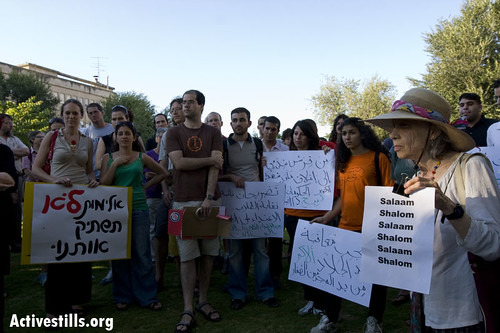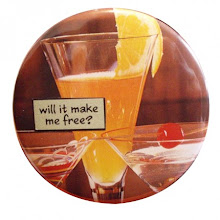Yesterday I met Edna U-M, my academic adviser at HUJI. Among other things, she told me that she and
another professor placed bets on my gender — he was sure that I was a guy, and she hadn't even considered the possibility. But after hearing him refer to me in the masculine, she checked back over the emails I'd sent her, and found that there was no indication. "After all," she explained, "yours is a non-gender-specific name."
Okay, I should probably be over it by now, but I still get such a kick out of the fact that my weirdo first name is familiar here.
So you can just imagine my emotions about what came next. I mentioned that I'm staying with my grandmother, and she asked, "the grandmother on dad's side?"
"Yes"
"So, סדובסקי?"
"Right."
"Are you from
those סדובסקים?"
Seriously! I'd only heard about this phenomenon. When my father and his brothers and sister were in school, the first time the teachers called attendance, they always got asked that question. Here in Israel, people are incredibly appreciative of obstetricians — or at least, they were in the heydey of Saba's hospital. So even today, in Jerusalem, we're
those סדובסקים.
I suddenly remembered that when I was applying for my scholarship, my father told me we had a family connection to Edna U-M. My grandfather had delivered her kids.
"Oh, right, we have that connection..." I started, but she said,
"No, no, personal connection or not —
everyone in knows the סדובסקים."
It turns out that Saba Arie (my great-grandfather) was the doctor who delivered Edna, and my grandfather, Eliahu, delivered all four of her kids. She even remembered my grandfather's early death — from cancer, when I was about seven years old. "It was such a shock in Jerusalem, when Eliahu died. After all, Arie lived to an old age.... He was a big man, Eliahu, wasn't he?" she smiled, "I'll admit that I was a bit afraid of him."
So I told her the story about the Haddassah nurse: When my mom was a patient in my grandfather's ward at Haddassah, she asked a nurse for some little thing, and the nurse said that she'd have to check with Professor סדובסקי and he probably wouldn't allow it. (Later, the nurse noticed the last name on my mother's medical chart and begged her not to tell.)
That night, I got more stories about those famous doctors. Baya told me about Saba's irreverant bedside manner. (To find out if a patient was lactating, he asked, "How's the
Tnuva?") I never knew that he'd delivered all five of her kids. "He was the best. When I had the twins, people asked me why I'm going to such an old obstetrician. But I knew he was still the best. His hands were steady and strong. Our twins set the record for the biggest twins born in Haddassah."









